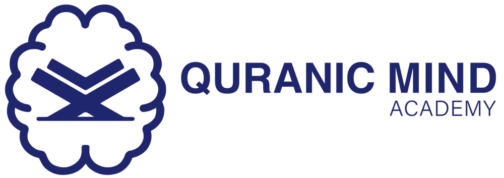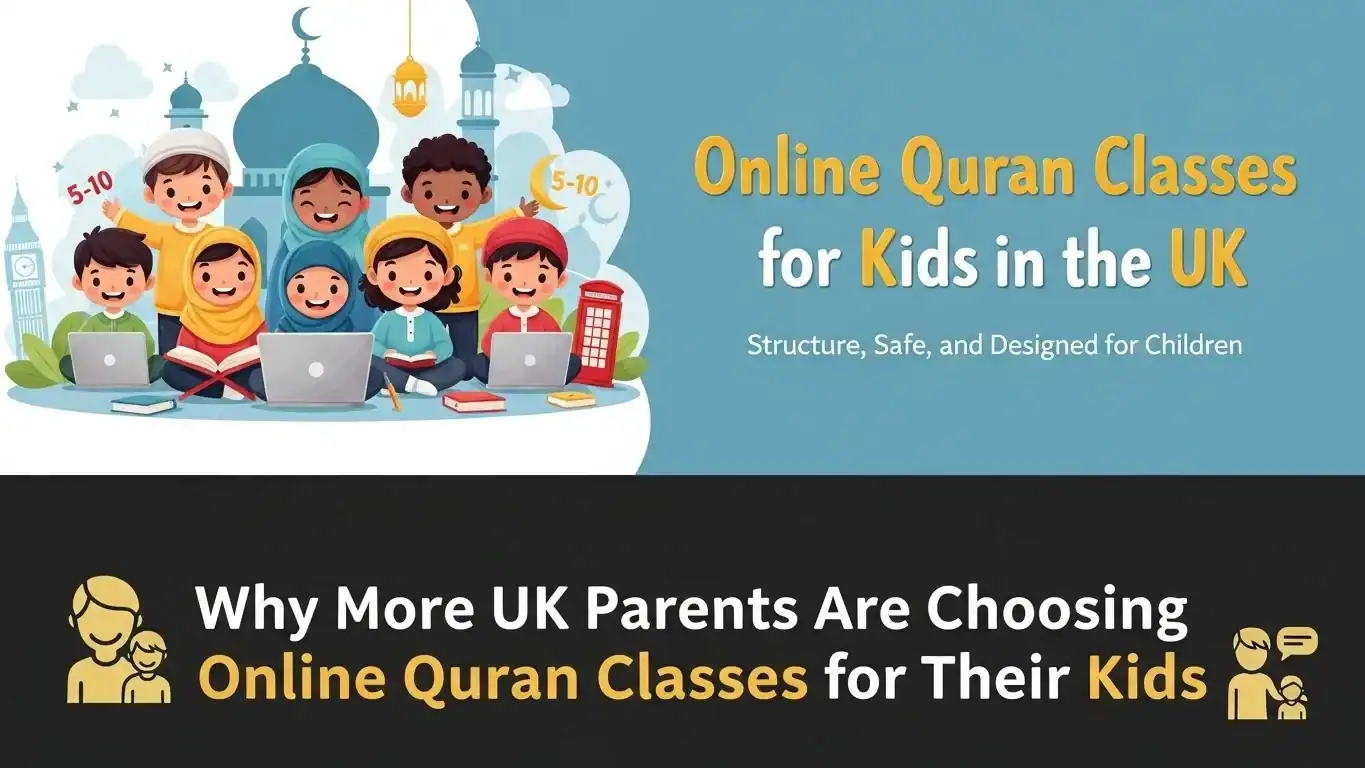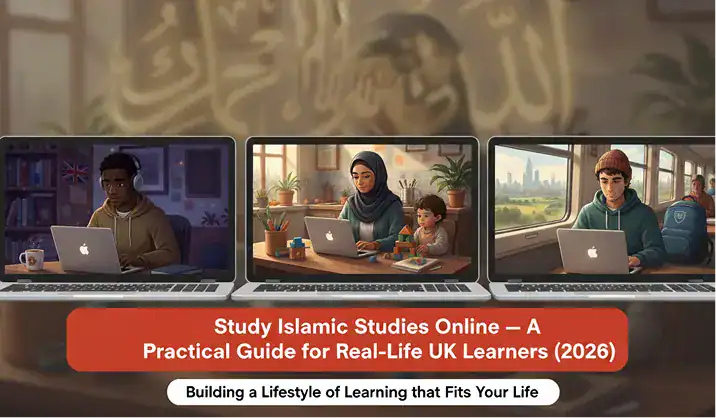Seeking Knowledge in Islam
Seeking knowledge in Islam is more than a noble act — it is a divine obligation.
The Prophet Muhammad ﷺ said: “Seeking knowledge is an obligation upon every Muslim.” (Ibn Majah)
This hadith shows that learning the basics of Islam is Fard ‘Ayn for every believer.
Beyond the essentials, higher levels of knowledge become Fard Kifayah, a shared duty that keeps the Muslim community strong.
Why Seeking Knowledge in Islam is Important?
-
- It connects a Muslim directly to Allah through correct worship.
- It protects from ignorance and misguidance.
- It gives clarity in matters of faith and life.
- It transforms personal growth into community benefit.
Seeking Knowledge is an Obligation Upon Every Muslim:
This principle applies to:
-
- Men and women equally.
- Young Muslims beginning their journey.
- Adults who return to strengthen their faith.
Seeking knowledge is lifelong — from cradle to grave.
Types of Knowledge in Islam:
In Islam, knowledge is divided into two main categories:
-
- Religious Knowledge (Ilm al-Deen)
- Quran, Sunnah, Aqeedah, Fiqh.
- This is essential for every Muslim to practice faith correctly.
- Worldly Knowledge (Ilm al-Dunya)
- Medicine, languages, technology, and sciences.
- Praised in Islam when used for the benefit of humanity.
- Religious Knowledge (Ilm al-Deen)
👉 Seeking knowledge in Islam means balancing both — spiritual and worldly — always with the right intention.
Table: Religious vs Worldly Knowledge in Islam:
| Type of Knowledge | Examples | Value in Islam |
| Religious Knowledge (Ilm al-Deen) | Quran, Hadith, Aqeedah, Fiqh | Obligatory for every Muslim to practice faith correctly |
| Worldly Knowledge (Ilm al-Dunya) | Medicine, Technology, Languages, Sciences | Praised in Islam when used to benefit humanity |
👉 This balance shows that seeking knowledge in Islam is not limited to religion alone, but also includes beneficial sciences that support the Ummah.
Start your journey on WhatsApp
Hadith About Seeking Knowledge:
The Prophet ﷺ encouraged Muslims to seek knowledge with many promises:
-
- “Whoever follows a path to seek knowledge, Allah will make easy for him a path to Paradise.” (Muslim)
- “The angels lower their wings for the seeker of knowledge.” (Abu Dawood)
- “The superiority of the scholar over the worshipper is like the moon over the stars.” (Tirmidhi)
These hadiths show that seeking knowledge in Islam is not just duty, but also a way to gain honor in this world and reward in the Hereafter.
Benefits of Seeking Knowledge in Islam:
Learning in Islam transforms both individuals and society. Among the main benefits are:
-
- Closeness to Allah – true knowledge increases Taqwa.
- Correct Worship – protects from mistakes and innovation.
- Community Leadership – scholars guide and uplift others.
- Inner Peace – knowledge removes doubts and confusion.
- Elevation of Status – “Allah will raise those who believe and those given knowledge in ranks.” (58:11)
5 Benefits of Seeking Knowledge in Daily Life:
| Benefit | Impact on a Muslim’s life |
| Stronger Faith | Confidence in worship and Aqeedah |
| Family Stability | Parents guide children with wisdom |
| Social Honor | People respect and trust scholars |
| Protection | Guards from false beliefs |
| Da’wah | Ability to share Islam with others |
How to Start Seeking Knowledge in Islam:(Step by Step)
Many people wonder: “Where do I begin?”
Here’s a simple guide to make seeking knowledge in Islam easier:
-
- Correct Your Intention → seek knowledge for Allah, not fame.
- Start with the Basics → Salah, Wudu, Tawheed, Aqeedah.
- Learn Gradually → move from small texts to deeper studies.
- Find a Teacher → guidance prevents confusion and misinterpretation.
- Be Consistent → even 15 minutes daily builds a foundation.
- Apply What You Learn → knowledge without action loses its value.
Seeking Knowledge Hadith Explained:
The famous hadith “Seeking knowledge is an obligation upon every Muslim” teaches us:
-
- Every Muslim must know the essentials of belief and worship.
- Knowledge of Salah, fasting, and Aqeedah is not optional.
- Advanced studies (Fiqh, Tafsir, sciences) are communal duties that strengthen the Ummah.
- The hadith also reminds us that learning never ends — it continues until death.
Start your journey on WhatsApp
What is Knowledge in Islam?
In Islam, knowledge (Ilm) is not limited to books. It includes:
-
- Understanding the Quran with proper Tafsir.
- Studying Hadith and applying Sunnah in daily life.
- Learning Arabic to connect with original texts.
- Exploring useful sciences that serve humanity.
👉 This balance makes seeking knowledge in Islam unique — it uplifts both the soul and society.
Seeking Knowledge in Islam for Daily Life:
Knowledge is not just theory. It impacts everyday living:
-
- Helps Muslims raise their children with strong faith.
- Guides decisions in work, family, and community.
- Protects from doubts, misinformation, and harmful ideologies.
- Encourages Muslims to contribute positively to society.
📌 The more a Muslim learns, the more confident and balanced their life becomes.
Staying Committed to Seeking Knowledge in Islam:
Consistency is the biggest challenge for many learners.
Here are simple ways to stay motivated:
-
- Surround Yourself with Learners → join study groups or online classes.
- Set Small Goals → focus on one subject at a time (Fiqh basics, Seerah, Tafsir).
- Use Digital Tools → Islamic apps, online notes, recorded lessons.
- Ask Questions → don’t allow confusion to grow.
- Remember the Reward → every moment spent in knowledge is worship.
Table: Stages of Seeking Knowledge in Islam:
| Stage | Knowledge Focus | Tools You Need |
| Beginner | Tawheed, Salah, Wudu, Fasting | Short books, online basics |
| Intermediate | Seerah, Hadith, Tafsir Basics | Notebooks, teacher guidance |
| Advanced | Fiqh, Usul al-Fiqh, Arabic, Aqeedah | Arabic texts, mentorship |
Learn Islam the Right Way with Quranic Academy:
At Quranic mind, we help Muslims in the UK and beyond make seeking knowledge in Islam easy and structured:
-
- 🎓 1-on-1 Islamic Studies Classes with Azhar-certified teachers.
- 📖 Step-by-step learning: Aqeedah, Fiqh, Seerah, Hadith.
- 🌍 English-speaking scholars who understand the needs of non-Arabic speakers.
- ⏰ Flexible schedules that fit busy lives in the UK.
- 🆓 Two free trial classes to begin confidently.
👉 Begin your journey with our Islamic Studies Course and take your first step on the path of knowledge.
Frequently Asked Questions:
❓What is the hadith about seeking knowledge?
The Prophet ﷺ said: “Seeking knowledge is an obligation upon every Muslim.” (Ibn Majah)
❓ Why is knowledge important in Islam?
Because it protects faith, guides worship, and elevates a Muslim’s rank in both dunya and akhirah.
❓Is seeking knowledge in Islam for men only?
No. The obligation includes both men and women equally.
❓What are the benefits of seeking knowledge in Islam?
Closeness to Allah, protection from doubts, respect in society, and guidance for the Hereafter.
❓Can I seek knowledge in Islam online?
Yes. With structured courses and trusted teachers, online learning is effective and flexible.
🔚 Final Thoughts
Seeking knowledge in Islam is a lifelong journey — it begins with one step, one lesson, one teacher.
Every moment you spend learning brings you closer to Allah, strengthens your worship, and guides your family.
📌 Don’t wait. Start today with Quranicma Academy and make knowledge your path to light.




